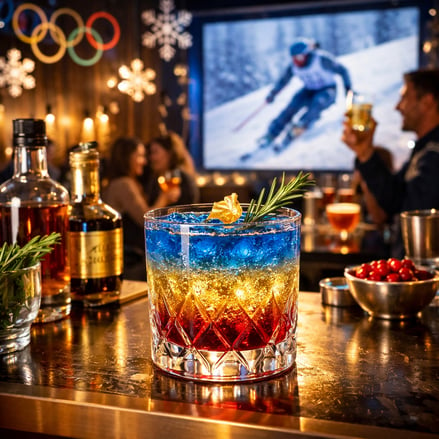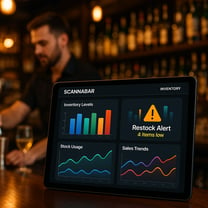Discover how Scannabar's innovative automated inventory audit solution is transforming retail operations by eliminating manual counting errors, reducing labor costs, and providing real-time stock visibility across your entire supply chain.
The Hidden Costs of Manual Inventory Management in Retail
Manual inventory management continues to drain retail resources in ways that often go unnoticed until the damage is already done. Traditional counting methods require significant labor hours, with employees spending countless hours walking aisles, scanning items, and recording data by hand. This not only diverts staff from customer-facing activities but also introduces substantial room for human error that can cascade throughout your entire operation.
done. Traditional counting methods require significant labor hours, with employees spending countless hours walking aisles, scanning items, and recording data by hand. This not only diverts staff from customer-facing activities but also introduces substantial room for human error that can cascade throughout your entire operation.
The financial impact extends far beyond just labor costs. Inaccurate inventory counts lead to overstocking, which ties up valuable capital in excess inventory, or understocking, which results in lost sales and disappointed customers. Research shows that inventory accuracy in retail typically hovers around 63% with manual processes, meaning nearly 40% of your stock data could be incorrect at any given time. These discrepancies create a domino effect that impacts purchasing decisions, fulfillment capabilities, and ultimately, your bottom line.
Scannabar addresses these challenges head-on by automating the entire inventory audit process. By eliminating the need for manual counts and reducing the time spent on inventory management by up to 90%, retailers can redirect their workforce toward more strategic, revenue-generating activities while ensuring accuracy rates that exceed 99%.
Smart Barcode Technology That Works Around the Clock
Scannabar's intelligent barcode scanning technology revolutionizes how retail stores monitor their inventory by providing continuous, automated surveillance of stock levels. Unlike traditional systems that require scheduled manual scans, Scannabar's technology operates autonomously, capturing data 24/7 without interrupting normal business operations. The system utilizes advanced scanning mechanisms that can read multiple barcodes simultaneously, processing thousands of items in the time it would take an employee to count just a handful.
The technology is designed with retail environments in mind, capable of reading barcodes from various angles and even in challenging conditions such as poor lighting or partially obscured labels. This adaptability ensures that your inventory tracking remains consistent and reliable regardless of how products are positioned on shelves or in storage areas. The smart sensors can distinguish between different product variations, sizes, and SKUs, providing granular detail that manual counting simply cannot match.
What sets Scannabar apart is its ability to learn and adapt over time. The system's algorithms recognize patterns in your inventory movement, identifying fast-moving products, seasonal trends, and potential stockout situations before they become critical. This predictive capability transforms inventory management from a reactive process into a proactive strategy, allowing retailers to stay ahead of demand and optimize their stock levels continuously.
Real-Time Data Synchronization Across Multiple Locations
For retail chains operating across multiple locations, maintaining consistent and accurate inventory data has traditionally been a nightmare. Scannabar's cloud-based platform solves this challenge by providing instant synchronization of inventory data across all your retail locations. The moment an item is scanned, sold, or restocked at any location, that information is immediately updated in the central system and reflected across your entire network.
This real-time visibility transforms how multi-location retailers manage their supply chain. Store managers can instantly check inventory levels at other locations to fulfill customer requests, preventing lost sales due to local stockouts. District and regional managers gain a comprehensive bird's-eye view of inventory distribution, enabling them to identify opportunities for inventory transfers between locations to optimize stock levels and reduce waste. The centralized dashboard provides actionable insights that help decision-makers understand inventory health across the entire organization at a glance.
The synchronization capabilities extend beyond just inventory counts. Scannabar tracks inventory movement patterns, turnover rates, and location-specific trends, providing valuable data that helps retailers make informed decisions about product placement, ordering quantities, and distribution strategies. This level of coordination ensures that each location maintains optimal stock levels while minimizing the total inventory investment across the chain.
Reducing Shrinkage and Improving Stock Accuracy
Inventory shrinkage remains one of the most significant challenges facing retailers today, costing the industry billions of dollars annually through theft, damage, administrative errors, and supplier fraud. Scannabar's automated audit system creates a powerful deterrent against shrinkage by establishing a comprehensive tracking system that monitors every item from receipt to sale. The continuous monitoring capability means that discrepancies are identified immediately rather than months later during annual physical counts, allowing retailers to address issues while the trail is still warm.
The system's precision dramatically improves stock accuracy by eliminating the counting errors that plague manual inventory processes. Every scan is recorded with a timestamp, location marker, and user identification when applicable, creating an audit trail that provides complete accountability. When variances occur, managers can quickly drill down into the data to identify exactly when and where the discrepancy originated, whether it was a receiving error, a point-of-sale mistake, or potential theft.
Beyond detection, Scannabar's analytics help retailers understand shrinkage patterns and implement targeted prevention strategies. The system can identify high-risk products, times of day when discrepancies are most likely to occur, and locations that experience higher-than-average shrinkage rates. Armed with this intelligence, retailers can deploy resources more effectively, adjust security measures, improve training programs, and implement policies that address the root causes of shrinkage rather than just treating the symptoms.
Seamless Integration with Existing Retail Management Systems
One of the biggest concerns retailers have when considering new technology is the disruption it might cause to existing operations. Scannabar eliminates this worry with its flexible integration capabilities designed to work harmoniously with virtually any retail management system, POS platform, or ERP solution. The platform features pre-built connectors for major retail software providers and an open API architecture that allows custom integrations for proprietary systems.
Implementation is straightforward and minimally disruptive. Scannabar's team works closely with your IT department to map data fields, establish synchronization protocols, and test the integration thoroughly before going live. The system can be deployed in phases, starting with a pilot location to validate the process before rolling out across your entire retail network. Most retailers find that they can complete full implementation within weeks rather than months, with minimal downtime or disruption to daily operations.
Once integrated, Scannabar functions as a seamless extension of your existing retail infrastructure. Inventory data flows automatically between systems, eliminating the need for manual data entry or file transfers. The platform enhances your current systems rather than replacing them, adding a powerful automated audit layer that improves the accuracy and reliability of the data flowing through your entire retail ecosystem. Updates and maintenance are handled automatically through the cloud, ensuring that your system stays current with the latest features and security protocols without requiring IT intervention.


 Real-time stock monitoring revolutionizes how banquet facilities manage their inventory by providing instant, accurate visibility into stock levels at any moment. This technology eliminates the guesswork and delays inherent in traditional inventory methods, allowing managers to access up-to-the-minute data on every item in their inventory from any device, anywhere. Whether you're on the banquet floor, in a planning meeting, or reviewing operations from home, you have complete transparency into what's in stock, what's running low, and what needs to be ordered.
Real-time stock monitoring revolutionizes how banquet facilities manage their inventory by providing instant, accurate visibility into stock levels at any moment. This technology eliminates the guesswork and delays inherent in traditional inventory methods, allowing managers to access up-to-the-minute data on every item in their inventory from any device, anywhere. Whether you're on the banquet floor, in a planning meeting, or reviewing operations from home, you have complete transparency into what's in stock, what's running low, and what needs to be ordered. Beverage waste is a significant challenge for cruise ships and marine hospitality operations, impacting both profitability and the environment. Wasted beverages translate directly into lost revenue and increased operational costs, as every unused or discarded drink represents not only a sunk cost in ingredients, but also in storage, transportation, and disposal.
Beverage waste is a significant challenge for cruise ships and marine hospitality operations, impacting both profitability and the environment. Wasted beverages translate directly into lost revenue and increased operational costs, as every unused or discarded drink represents not only a sunk cost in ingredients, but also in storage, transportation, and disposal.




 Since implementing Scannabar, our inventory processes have become remarkably streamlined. The software's user-friendly interface allows us to quickly and efficiently track our stock levels, reducing the time spent on manual inventory tasks.
Since implementing Scannabar, our inventory processes have become remarkably streamlined. The software's user-friendly interface allows us to quickly and efficiently track our stock levels, reducing the time spent on manual inventory tasks.
